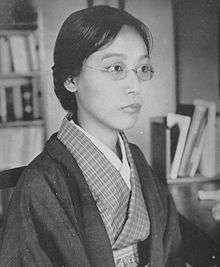Yamakawa Kikue
| Yamakawa Kikue | |
|---|---|
 photographed in 1920 | |
| Native name | 山川菊栄 |
| Born |
3 November 1890 |
| Died |
2 November 1980 (aged 89) |
| Notable work | Women of the Mito domain : recollections of samurai family life |
| Partner | Yamakawa Hitoshi |
Yamakawa Kikue (山川菊栄) (1890 in Tokyo, Japan – 1980) was a Japanese activist, writer, socialist, and feminist. She is perhaps best known for being one of the founding members of the socialist group Sekirankai (Red Wave Society).
Early life
Yamakawa Kikue was born Aoyama Kikue to a hereditary samurai family in Tokyo in 1890. Her family's relatively privileged background allowed her to attend the private women's college Joshi Eigaku Juku (renamed Tsuda Juku Daigaku in 1948) in Kodaira, Tokyo. During this time, she met fellow Japanese feminists Kamichika Ichiko and Hiratsuka Raicho, editor of the feminist periodical Seitō. Her relationship with Hiratsuka Raicho was particularly important because it led to her contributing several articles to Seitō and ultimately being a part of the Seitōsha (or “bluestockings”) feminist movement.
Yamakawa Kikue had mixed feelings about her education. On one hand, she described her teachers Tsuda Umeko and Kawai Michi as “pure idealists. They were naïve and innocent, totally cut off from the real world. They were completely unaware of what the students were thinking about and what they were searching for.” On the other hand, she respected Tsuda Umeko as a pioneer in the education of Japanese women because of her rejection of the “slave morality” and “spineless submissiveness” taught at other Japanese women's colleges. Yamakawa graduated from Joshi Eigaku Juku after four years of attendance.
In 1916, Yamakawa Kikue married outspoken socialist Yamakawa Hitoshi. During the early years of her marriage, she spent most of her time writing socialist and feminist works, as well as translating existing pieces. She contracted tuberculosis shortly after her marriage and took a short break from her work to recover.
Activism
Yamakawa transitioned from a theorist to an activist when she helped found the Sekirankai (Red Wave Society) in April 1921. The Sekirankai's main goal was the abolition of capitalism, which it saw as the greatest source of women's oppression. Specifically, the group sought equal wages between men and women, the abolition of prostitution, and special rights and protection for mothers. After several tumultuous events, including police violence and party reorganization, the Sekirankai was disbanded in June 1923.
When the Japanese Communist Party was re-established in 1925, Yamakawa submitted the following six-point demand for equal gender rights:
- Abolish the patriarchal household system. Abolish all laws that enforce inequality between men and women.
- Equal opportunities in education and employment.
- Abolish the system of licensed prostitution.
- Guarantee an equal minimum wage, regardless of sex or ethnicity.
- Equal pay for equal work.
- Protection of motherhood.
All but the third proposal were accepted by the Party. The call to abolish prostitution was left undecided because the Party was split fifty-fifty on the issue. Yamakawa was upset about this, because she felt that all six of these points were “fundamental demands of the women's liberation movement” and that “opposition to them cannot have been anything other than conservative reactionism.”
Like many other Marxists at the time Yamakawa was unsympathetic towards the suffrage movement and saw the women's suffrage movement as a form of control: “I was extremely fearful that the end result of simply wanting the right to vote without deciding the purpose of this or the kind of society that we wanted to create, would not be women's liberation but the use of women as weapons of the military-beauraucratic dictatorship.”
During World War II, the Japanese socialist movement was outlawed. As a result, Yamakawa Hitoshi was imprisoned, as he was a prominent member of the Communist movement. With her husband in prison, Yamakawa Kikue struggled to support herself, and as a result, her activism was sidelined. During that time, she attempted to raise quail to eke out a living. Additionally, she raised income by writing politically nonvolatile commissioned pieces, such as Women of the Mito Domain: Recollections of Samurai Family Life (1943). After the war, the couple both joined the Japan Socialist Party. Yamakawa Kikue served as the head of the Women and Minors Bureau of the Ministry of Labor from 1947 to 1951. In 1956, she published her autobiography Onna Nidai no Ki (A Record of Two Generations of Women). Her husband died in 1958, and she continued her writings until her death at the age of 90 in 1980.
References and further reading
- Hane, Mikiso. Reflections on the Way to the Gallows: Rebel Women in Prewar Japan. Berkeley: University of California Press, 1993.
- Prang, Margaret. A Heart at Leisure from Itself: Caroline Macdonald of Japan. Vancouver: University of British Columbia Press, 1997.
- Ueno, Chizuko. Yamamoto, Beverly. Nationalism and Gender. Melbourne: Trans Pacific Press, 2004.
- Gordon, Andrew. A Modern History of Japan: From Tokugawa Times to Present. New York: Oxford University Press, 2009.
- Itasaka, Gen. Kodansha Encyclopedia of Japan. Kodansha America, 1983.
|